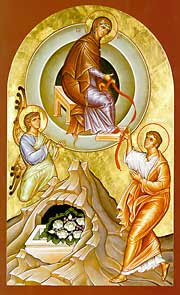Tomorrow is the feast of St. Joseph. For years I've sat on the side of the daily chapel for the Hours which faces a statue of St. Joseph. He holds the iconic lily and carpenter's square, but what draws me in is the look on his face and tenderness with which he holds a young -- but not infant -- Jesus in his arms. When I was contemplating the Hidden Years in the Exercises, this was the face I saw.
The traditions in East and West diverge early on St. Joseph. Augustine and Jerome postulating perpetual virginity for Joseph, the East sticking to the apocrypha and considering him a widower. So far no one has succeeded in making either position dogma, so I'm free to disagree.
This column appeared in the Catholic Standard & Times on 18 March 2010.When his mother Mary was betrothed to Joseph, but before they lived together, she was found with child through the Holy Spirit. Joseph her husband, since he was a righteous man, yet unwilling to expose her to shame, decided to divorce her quietly. — Mt. 1:18-19
“Do not speculate beyond the text. Do not require of it more than it simply says,” advised St. John Chrysostom, preaching in the fourth century on this fragment from Matthew’s Gospel. It was advice that had long been unheeded, at least when it came to St. Joseph. Though nearly all that we know of Joseph, the husband of Mary, is here — he was a righteous man — speculation about Joseph’s life had been rampant for at least 200 years by the time St. John offered his counsel.
Was Joseph a widower? Did he have other children? Was he old or young? When did he die?
It’s hard not to be curious about the man who would have known Jesus so well, his foster-father. A few lines later, in fact, John Chrysostom himself would ignore his own advice, asking his congregation to imagine Joseph’s virtues, “Do you not see here a man of great self-restraint? ...”
From the canonical Gospels we know only that he was a “righteous man” and a carpenter. My father is a carpenter, and as long as I can remember I’ve been in awe of what he can fashion from wood. Under his hands awkwardly shaped and seemingly unyielding pieces of wood become beautifully turned spindles for my nephew’s crib and carefully crafted shelves for my books.
The smell of sawdust is the smell of wonder and creation. So I’m not surprised that God, Creator of all, would choose to dwell in the house of a carpenter, to live surrounded by these small mysteries of creation.
Sources such as the apocryphal Protevangelium of James, which dates to the second century or earlier, and the fifth century “History of Joseph the Carpenter” suggest St. Joseph was a widower and the father of four sons and two daughters. Contemporaries of John Chrysostom, Saints Augustine and Jerome, had different ideas about Joseph’s earlier life, thinking it was fitting that he was not a widower, but like Mary, ever virgin.
I hesitate to disagree with the great doctors Augustine and Jerome, but having been widowed and remarried myself, I wonder if it is not more reasonable that Joseph had been married once before his betrothal to Mary.
To marry again you are risking being widowed again, now knowing full well the pain that brings. It takes a different kind of courage to submit yourself again to the possibility of such a loss.
Christ, having once emptied Himself to become man, will surrender His life once again on the cross. How much might a widowed Joseph’s willingness to love and cherish Mary, in the face of potential pain and loss, have strengthened Jesus in the garden at Gethsemane as he surrendered to suffering, for love of us?
I require nothing more of the text than to know that Joseph was an upright man, who heard the voice of God, who cherished wife and Son, but I do yearn to go beyond it, not so much to know St. Joseph, but through him, to better learn what it is like to live with the Son of God in your home and in your heart.
He is that just man, that wise and loyal servant, whom you placed at the head of your family. With a husband’s love he cherished Mary, the virgin Mother of God. With fatherly care he watched over Jesus Christ your Son, conceived by the power of the Holy Spirit. — From the Preface for Joseph, Husband of Mary





